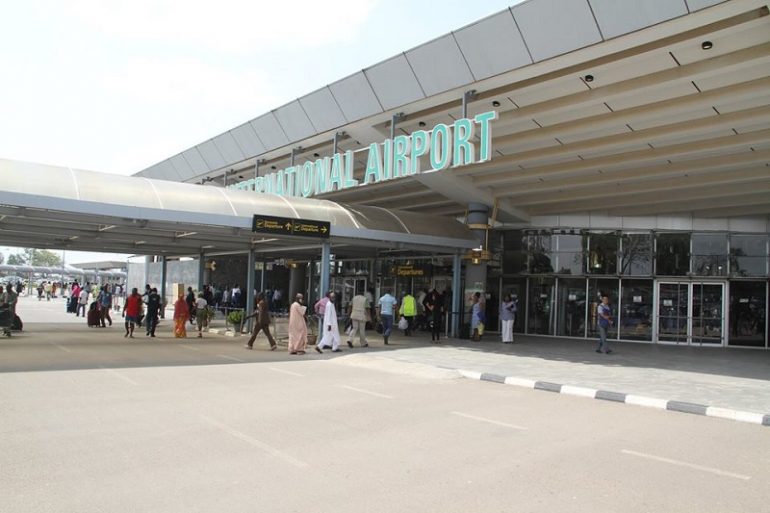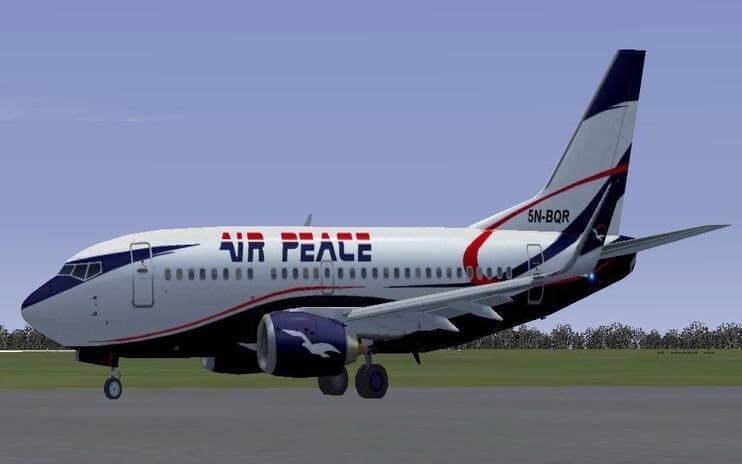Travel/Tourism
Abuja Airport Closure: Fashola Calls for Careful Driving to Avoid Accidents


By Dipo Olowookere
Ahead of the planned reconstruction and repair of the Abuja Airport runway, which would lead to a diversion of air traffic and passengers from Abuja to Kaduna, the Minister of Power, Works and Housing, Mr Babatunde Fashola at the weekend, inspected progress of work on the Abuja-Kaduna Highway.
The Minister, who stopped at several points on the road to ascertain the quality of work being done in company with the Minister of State, Mr Mustapha Baba Shehuri, and other senior officials of the Ministry, said the Federal Government through the Ministry was effecting the emergency repair work to ensure that the road was safe and motorable even as he called for careful driving to avoid accidents during the period of closure and on the nation’s roads generally.
In an interactive session with newsmen after the inspection, Mr Fashola said although government has embarked on the emergency repair of the road to make it safe by removing the potholes , a lot depended on the users of the road to ensure that they remain safe and avoid accidents while the closure lasted.
The Minister, who said he would wish a day when no accidents would be reported on the nation’s roads, expressed regrets that such a wish remained farfetched adding that apart from the condition of the roads, human error constituted, from available reports, a very significant factor in road accidents.
Recalling an accident that occurred on the same day on the road involving a heavy truck, the Minister said the accident most likely happened in the night advising that those who drive heavy trucks in the night must try and get as much as sleep as they could during the day.
Also advocating training and retraining for drivers, Mr Fashola declared, “I think that it is fair to say that not many people who manage vehicles on our roads are actually trained to manage vehicles on the roads; many people are auxiliary drivers for want of something better to do”.
“There are rules in the operation and utilization of automobiles”, he said adding that the FRSC has continued to address the problem in terms of education, enlightenment and the introduction of a speed limiting device while his Ministry was also looking at how to assist them in the short to medium terms by introducing some speed cameras to deter people and support the efforts of the Corps.
Pointing out that the wish to stay alive rested ultimately it in the hands of drivers themselves, Mr Fashola said such a wish must be matched with abstention from substance abuse that some vehicle operators subject their bodies to adding that such abuses make their bodies vulnerable.
He, however, said the effort to prevent or limit accidents on the nation’s roads was an obligation on the government which, according to him, must not be given up adding that there was need to also go back to the primary schools and begin to teach road traffic behaviour from the foundation while also enlightening the older generation “that they must begin to prepare the younger generation to make sure they become better road users in future”.
On the purpose of the inspection, the Minister, who clarified that the work being carried out on the road was an emergency repair, and not the real reconstruction of the road, essentially to remove the potholes and reduce the risk of accidents, added that the purpose was to see the progress made on the repairs as the date for the closure of the airport was drawing near.
He told newsmen that, “The work that is being done here, you must understand this is a road of more than 160 kilometres. We are at kilometre 130 from Abuja. So the work that is being done as I said is an emergency intervention essentially to remove the dangerous potholes and eliminate potential hazards that could cause accidents for motorists on this road”.
According to the Minister, there is a major contract provision that is going through Procurement for the essential reconstruction of the road, which he recalled, was constructed in the early 1990s when it was expanded from a single carriageway to a dual carriageway adding that no record indicated that there has been any major repairs ever since.
“So the road needs to be rebuilt because it has been subjected to a lot of axle load. But what we are doing right now is emergency repairs to remove the potholes to make the road safe for commuters ahead of the planned reconstruction and repair of the Abuja Airport runway which will lead to a diversion of air traffic and passengers from Abuja to Kaduna which will start on the 8th of March”, he said.
The Minister, who noted that the role of his Ministry was to make the road motorable and safe for commuters reiterated that he just came to inspect the place to see the progress of work first hand, promised that the Ministry would deliver the road and hoped that the Aviation counterpart would also deliver the runway in six weeks as scheduled by it.
He told the newsmen, “You can see that some sections have been resurfaced completely but that is not the main reconstruction of the road; let us be clear about what is happening here”.
“The whole purpose of this contract is to cover the potholes on the 160 kilometres road two lanes on one side and two lanes on the other side; so that is really to cover 620 kilometres of potholes; that is a contract for N1 billion,” Mr Fashola said, adding that the amount was not what would be needed to rebuild the road.
The Minister reiterated, “So let’s be clear about that. This is emergency short term. When the Bureau for Public Procurement (BPP) gives the no objection contract, we will start when the airport runway would have been completed”.
Travel/Tourism
Musawa, Governor Mba Commission Enugu Christmas Village

By Dipo Olowookere
The Enugu Christmas Village has been commissioned by the Minister of Arts, Tourism, Culture, and the Creative Economy, Ms Hanatu Musawa; and the Governor of Enugu State, Mr Peter Mba.
This development officially kicked off the holiday season in the state, giving residents and others from across Nigeria and outside the opportunity to relax in an atmosphere of love, positioning Enugu as a key destination for cultural and holiday tourism.
Facilitated by Omu Resort, a leading tourism promoter in Africa, the Enugu Christmas Village is set to become the heartbeat of holiday celebrations in the state.
The company has already organised a 25-day festival at the village designed to attract residents, visitors, and dignitaries from across the region.
With its vibrant atmosphere and festive attractions, the Enugu Christmas Village boasts an array of attractions such as a waterpark, roller skating, archery, amusement rides, and much more.
At its centre is a breathtaking display of 500,000 Christmas lights, illuminating the village in a magical glow that promises to captivate visitors of all ages.
The festival goes beyond the lights and rides, offering a rich tapestry of events that celebrate the state’s cultural heritage.
Highlights include Afrobeat Concert, Praise Night, Highlife Concert Street Carnival, Cultural Parade and a Grand Fireworks Show.
One of the most anticipated moments is the Santa Street Storm, where over 100 Santa Claus figures riding tricycles will parade through the streets, distributing gifts to orphanages and the less privileged, spreading joy and goodwill.
Running from December 7 to December 31, 2024, the Enugu Christmas Festival is more than just a celebration of the holiday season. It underscores the state’s cultural vibrancy and its potential as a leading tourist destination.
The festival offers a unique opportunity for families and friends to come together, celebrate, and unwind in a festive atmosphere. It is also expected to fosters unity and showcases the rich cultural heritage of Enugu State, while promoting arts, tourism, and community well-being.
Travel/Tourism
Emirates Unveils Airbus A350-900 in Dubai

By Aduragbemi Omiyale
One of the leading airline operators, Emirates Airline, has officially unveiled its first Airbus A350-900 at an exclusive event showcase in Dubai attended by aerospace partners, government officials and dignitaries, members of the media, as well as aviation enthusiasts.
The Emirates A350 features three spacious cabin classes, accommodating 312 passengers in 32 next-generation Business Class lie-flat seats, 21 Premium Economy seats and 259 generously pitched Economy Class seats.
The latest onboard products reflect the airline’s commitment to delivering a premium passenger experience while optimising operational efficiency. The Emirates A350 is the first new aircraft type to join Emirates’ fleet since 2008.
Apart from its newly delivered A350, Emirates operates two other aircraft types around the world to 140 destinations – the widebody Boeing 777 aircraft and the iconic ‘double decker’ Airbus A380 aircraft.
The A350’s introduction will enable Emirates to expand into new destinations globally, including mid-sized airports unsuited for larger aircraft. The Emirates A350 will be delivered in two versions – one for regional routes and one for ultra long-haul routes.
The Emirates A350 takes technology to another level. Customers can now adjust their electric window blinds at the touch of a button.
The aerBlade dual blind system will feature in Business and Premium Economy Class offering two shaded options, and the aerBlade single blind systems will make a debut in Economy Class, with all blinds showing the Emirates Ghaf tree motif when closed.
Business Class on the Emirates A350 will feature 32 luxurious leather ‘S Lounge seats’, inspired by the Mercedes S Class for an exceptional travel experience. The A350 aircraft will feature brand new additions of wireless charging on the side cocktail table in Business Class, and in-seat lighting controls with 5 streams of light. The 1-2-1 seat configuration in the A350 Business Class ensures a very private, exclusive experience.
Speaking at the event, the chairman of Emirates Airline, Mr Ahmed bin Saeed Al Maktoum, said, “Today is an exciting milestone for Emirates as we showcase our first A350 and usher in a new era for our fleet and network growth.
“This aircraft sets the stage for Emirates to spread its wings farther by offering added range, efficiency and flexibility to our network, enabling us to meet customer demand in new markets and unlock new opportunities in the cities that we serve.
“Onboard, our updated interiors and seating configurations will help us deliver a more elevated and comfortable experience to travellers across every cabin class.
“The 65 Emirates A350s joining our fleet in the coming years fit into the airline’s broader plans to support our visionary leadership’s Dubai’s D33 Strategy, which will transform the city into a pivotal hub in the global economy by expanding its connectivity and reach.”
Travel/Tourism
Air Peace Employees Undergo Training at Boeing Global Learning Institute

By Aduragbemi Omiyale
Some employees of Air Peace have upgraded their aviation safety skills at a training course organised by Boeing through the Boeing Global Learning Institute (BGLI) in collaboration with Cranfield University, United Kingdom as part of a shared commitment to shaping the future of aviation leadership.
Over the years, Air Peace has recognized that a deep, unwavering commitment to safety is key to its continued success.
The programme is aimed at building upon that vision, enabling executives to lead with confidence, manage risks effectively, and create high-performing teams that prioritize safety at every level.
In the five-day in-person training, all the executives and others in the various departments of Air Peace were taught advanced safety leadership skills and gained practical tools to implement the new knowledge.
The Head of Aerospace at Cranfield University, Prof Graham Braithwaite, said, “This collaboration ensured that the training directly addresses the challenges Air Peace faces, culminating in real-world capstone projects that would have a lasting impact.”
Reinforcing this position, the Lecturer for Organisational Resilience and Change at Cranfield School of Management, Fabian Steinmann, who was excited at the great progress Air Peace made over the years, said that they are happy to learn and share knowledge and find ways to strengthen the system, making it robust and flexible to adapt to the ever-changing environment.
“Safety is at the heart of everything we do at Cranfield so the privilege we have is that we travelled around the world, picked up the good practices, learned more about the culture and the operation in various countries so we’re here to facilitate that exchange with Nigeria and Air Peace to see how we share some of the good practices and lessons learned from all around the world and translate them into their operation.”
Also, the Senior Organisational Consultant and Programme Manager at Boeing Global Learning Institute, Harry Magui, said, “The Boeing company has long recognised the importance of supporting continuous learning of our aviation partners.
“To that end, the Boeing Global Learning Institute designs and delivers numerous learning programmes to both emerging and established leaders of our partners.
“These efforts aim to develop leadership, business, and technical skills so that our partners can improve their business processes, increase operational efficiency and enable leaders to strengthen their teams to ultimately grow their business.’
Alluding to the great work Air Peace has done in making safety a pre-condition rather than just a priority, Magui said, “We’re here to partner with our great partner, Air Peace who have been phenomenal in advancing the Aviation Industry in Nigeria, so we are here to support them to harness more opportunities in the future with the Advanced Leadership in Safety Excellence Training for all its top leadership within the organization.”
The Safety Manager at Air Peace, Captain Godfrey Ogbogu, said, “This class is quite essential and we’re lucky to have our resource persons impact knowledge on us. It is a well-structured training, especially for Air Peace because of where we are now and where we hope to go in the future.
“The whole essence of this class is to reinforce what we know before and be exposed to other avenues of learning. The aviation industry is ever-changing and dynamic, and Air Peace has to be abreast of such developments.”
-

 Feature/OPED5 years ago
Feature/OPED5 years agoDavos was Different this year
-
Travel/Tourism8 years ago
Lagos Seals Western Lodge Hotel In Ikorodu
-

 Showbiz2 years ago
Showbiz2 years agoEstranged Lover Releases Videos of Empress Njamah Bathing
-

 Banking6 years ago
Banking6 years agoSort Codes of GTBank Branches in Nigeria
-

 Economy2 years ago
Economy2 years agoSubsidy Removal: CNG at N130 Per Litre Cheaper Than Petrol—IPMAN
-

 Banking2 years ago
Banking2 years agoFirst Bank Announces Planned Downtime
-

 Sports2 years ago
Sports2 years agoHighest Paid Nigerian Footballer – How Much Do Nigerian Footballers Earn
-

 Technology4 years ago
Technology4 years agoHow To Link Your MTN, Airtel, Glo, 9mobile Lines to NIN




















